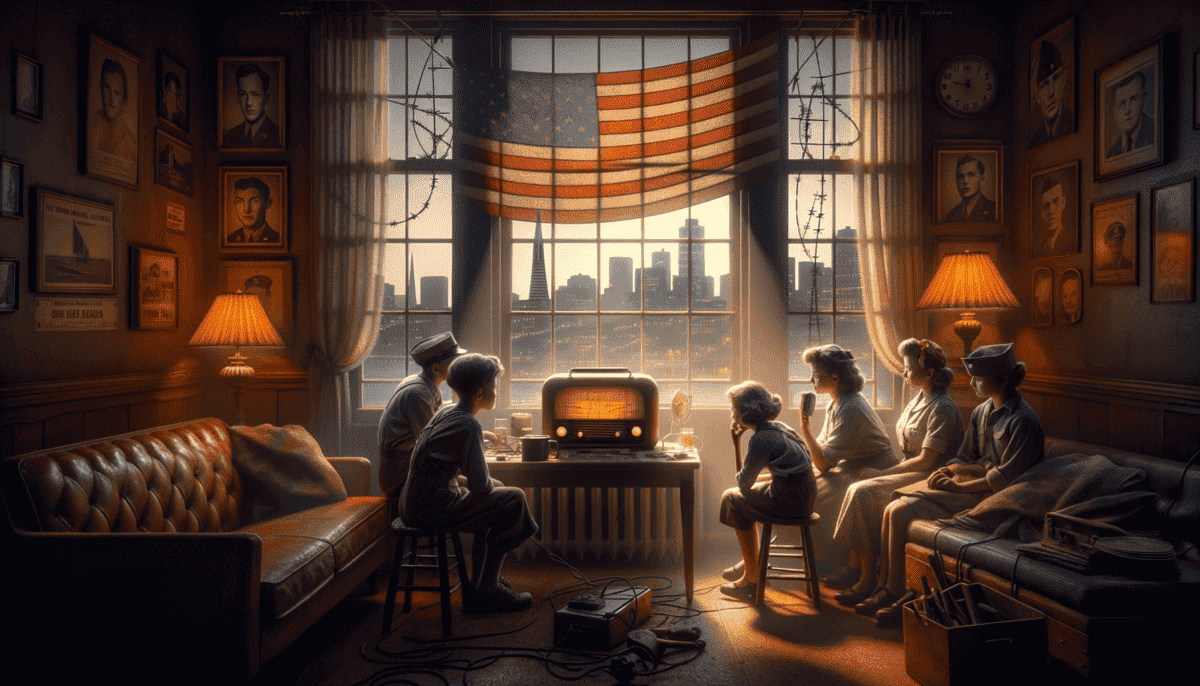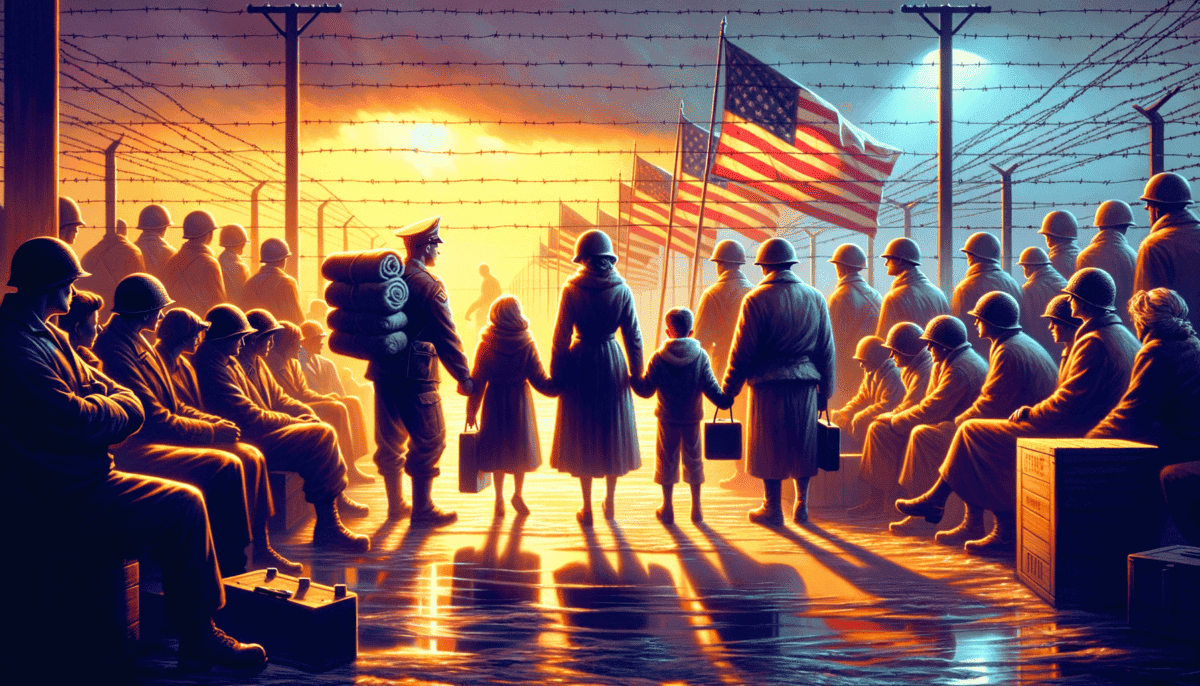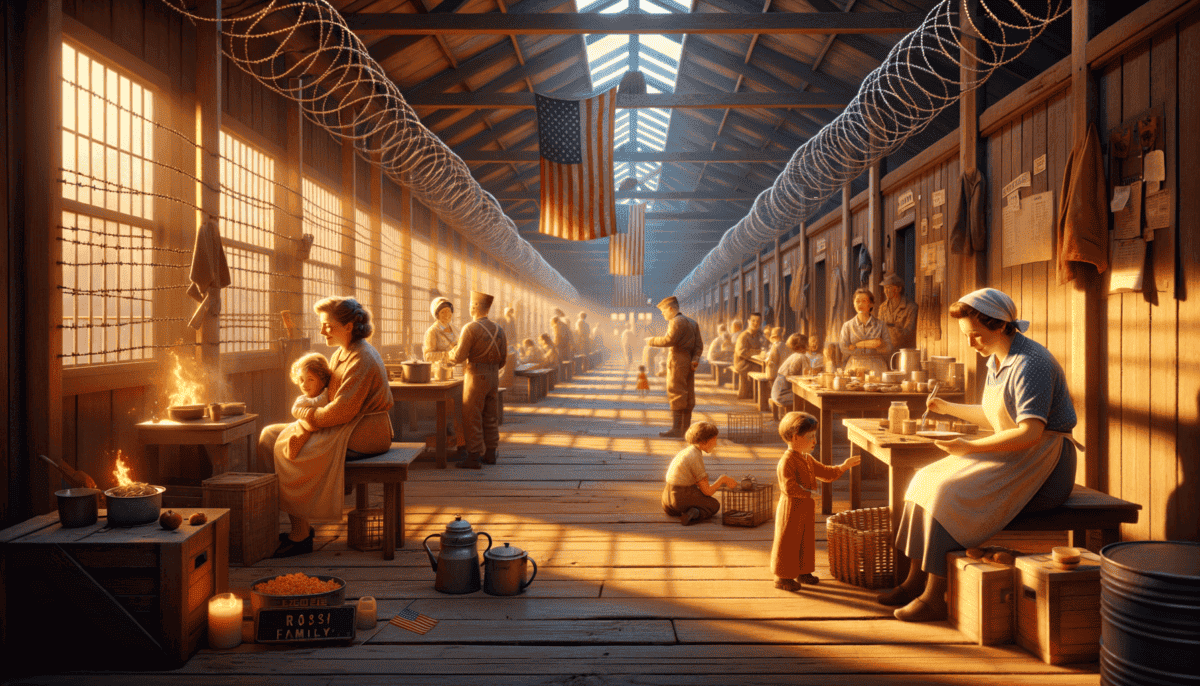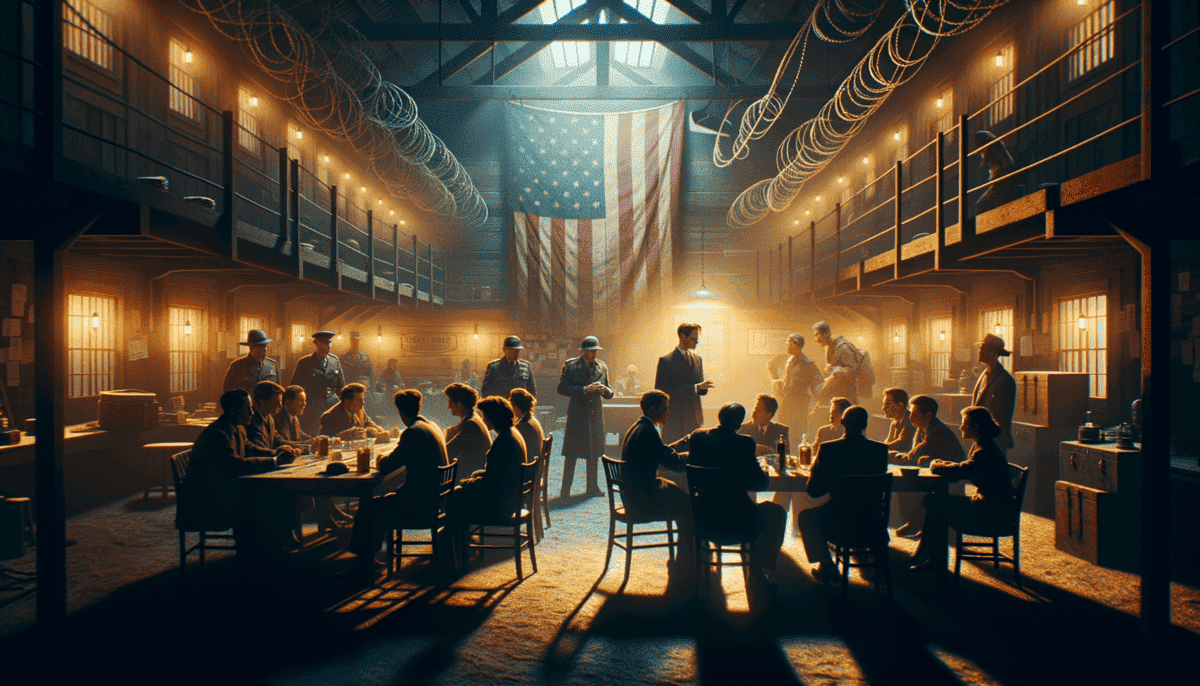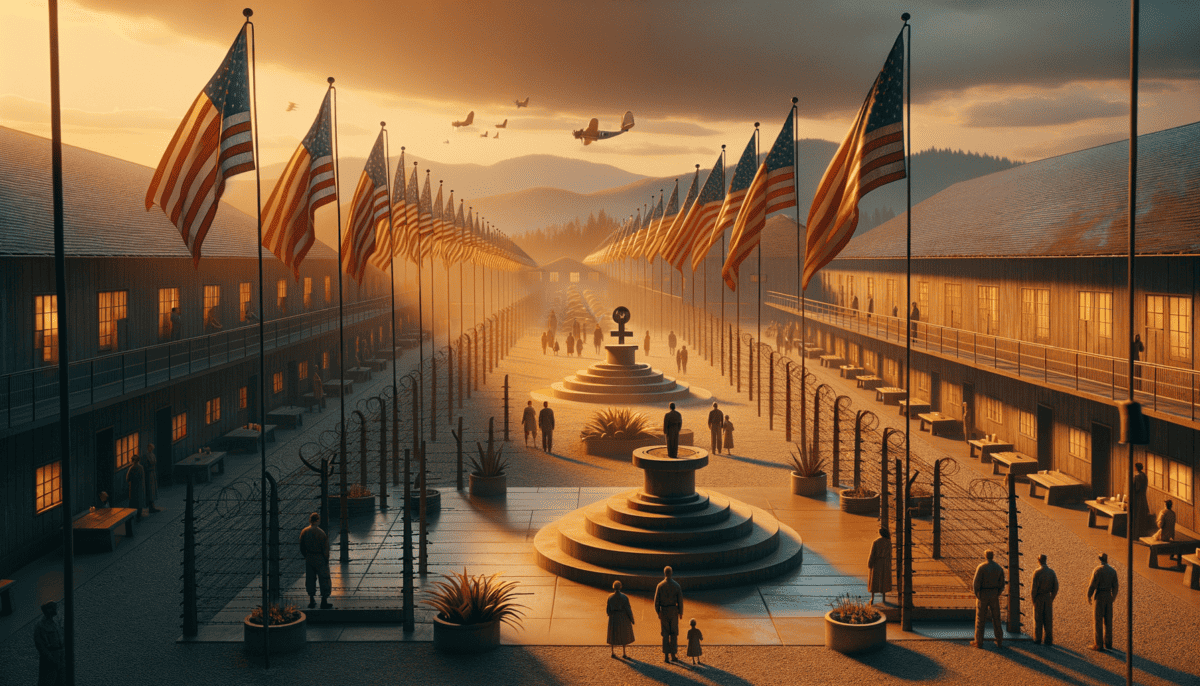Shadows of Suspicion
The sun was setting over San Francisco Bay when little Maria Rossi skipped home from school. The year was 1941, and the sweet smell of her mama's fresh bread filled their cozy house on Telegraph Hill.
"Papa, I'm home!" Maria called out, her dark curls bouncing as she ran into their family grocery store below their apartment.
Giuseppe Rossi looked up from stocking shelves with a warm smile. His store had been a neighborhood favorite for fifteen years. "There's my piccola!" he said, scooping her up in a big hug.
A Happy Family
The Rossis were proud Italian Americans. Their store sold pasta, olive oil, and other treats from the old country. Neighbors loved coming in to chat and shop.
"Mrs. O'Brien wants her usual order," Papa told Mama in the kitchen. "Business is good!"
But lately, things felt different. Maria noticed worried looks on grown-ups' faces when they talked about the war in Europe.
“They say Italy might join the war,” whispered Mr. Romano, their neighbor. “What will happen to us Italian Americans then?”
Strange Changes
One day, Maria saw men in dark suits watching their store. They wrote in little notebooks and asked Papa lots of questions.
"Who are those men, Papa?" Maria asked.
"Just some government people, sweetheart," Papa said with a forced smile. But his hands shook as he arranged cans on shelves.
Whispers and Worry
Things got scarier. Some customers stopped coming to the store. Maria's best friend Betty wouldn't play with her anymore.
"My mom says we shouldn't talk to Italians," Betty said at school. Maria ran home crying.
That night, Maria heard Mama and Papa talking in quiet voices:
"They're watching all the Italian businesses," Papa said. "The Germans too. They think we might be spies."
"But we're Americans!" Mama cried. "We love this country!"
Hard Choices
Papa started hiding their Italian flags and pictures of family in Italy. He even changed the store's name from "Rossi's Italian Market" to just "Rossi's Market."
"We must be careful now," he told Maria. "Some people don't trust us anymore."
At night, Maria hugged her doll Teresa tight. She didn't understand why being Italian suddenly meant being different. The radio talked about war and enemies, but her family wasn't anyone's enemy.
A Community Afraid
Other Italian families felt scared too. The Romanos stopped speaking Italian in public. The Ferraris closed their restaurant. Everyone wondered what would happen next.
One evening, Maria found Papa burning letters from their relatives in Italy.
"Why, Papa?" she asked.
"Sometimes, piccola," he said softly, "we must hide who we are to stay safe."
The flames ate up the papers as the sun set over San Francisco. Dark clouds gathered on the horizon – but no one knew just how dark things would soon become.
Maria held Papa's hand as they watched the letters turn to ash. Tomorrow would bring new worries, but tonight they still had each other. And that had to be enough.
The Day Everything Changed
It was a peaceful Sunday morning in December 1941. Maria sat at the breakfast table, watching Mama make pancakes shaped like hearts.
Suddenly, Papa burst through the door. His face was white as flour. The radio in his hand crackled with scary news.
“Pearl Harbor has been bombed! Japan has attacked America!”
A World Turned Upside Down
Everything happened so fast after that. The next day, police cars drove slowly past their store. More men in dark suits came asking questions.
“But we’re not Japanese,” Maria heard Mama say. “We’re Italian!”
“Doesn’t matter now,” the men replied. “Italy is with Japan in this war.”
New Rules
Papa came home with a thick stack of papers. His hands shook as he read them to Mama:
• They couldn't go more than 5 miles from home
• They had to be inside by 8:00 at night
• They couldn't have cameras or radios
• They needed special papers to travel
• They had to carry ID cards all the time
Saying Goodbye to Friends
More customers stopped coming to the store. Even kind Mrs. O’Brien crossed the street when she saw them.
“I don’t understand,” Maria cried. “We didn’t do anything wrong!”
Papa hugged her tight. “Sometimes people let fear make them forget who their real friends are.”
The Paper That Changed Everything
In February, President Roosevelt signed a special order – Executive Order 9066. Maria didn’t know what those big words meant, but she saw Papa’s face crumble when he read about it.
“They can make us leave our homes,” he whispered to Mama. “They can take everything.”
That night, Maria heard her parents crying in their room. She hugged Teresa, her doll, extra tight.
Getting Ready to Leave
Papa started selling things from the store cheap. Mama packed only what they could carry.
“What about my books?” Maria asked. “What about Teresa?”
“Just one small bag each,” Mama said softly. “That’s all they’ll let us take.”
The Last Day
Police put a sign on their store: “PROPERTY SEIZED BY U.S. GOVERNMENT”
Maria touched the store window one last time. This place had been her whole world. Now it would belong to strangers.
“Where will we go?” she asked.
“To a camp,” Papa said. “With other Italian and German families.”
As they walked away, Maria looked back at their home. The sunset painted the windows gold, just like always. But nothing would ever be the same again.
That night, in their last dinner at home, Papa squeezed their hands and said: “Remember who we are. No matter what happens, we are still a family. We are still Americans. And we will survive this together.”
Life Changes Fast
The big army truck bounced down the road. Maria held tight to her small bag with Teresa inside. Mama and Papa sat quiet, like statues. Other Italian and German families squeezed in too, all looking scared.
The Long Ride
“Are we there yet?” Maria whispered. Her legs felt like pins and needles.
“Not yet, piccola,” Mama said softly. “Try to sleep.”
Welcome to Camp
The truck stopped at a place with tall fences. Sharp wire sat on top, all twisted like angry snakes. Men with guns stood in tall towers.
“Everyone out!” a guard shouted.
Maria’s legs wobbled as she jumped down. The ground was just dirt – no grass, no flowers. Small wooden houses stood in rows, like broken toy blocks.
New Home, New Rules
“This is Block D, Building 16,” another guard said. “Your new home.”
Inside was one room with four beds. No kitchen. No bathroom. Just walls that let the cold wind blow through.
“We have to share bathrooms with everyone else,” Papa explained. “And eat in the big mess hall.”
Making Friends
Maria met Anna, another Italian girl her age. They shared secrets and played with their dolls.
“My doll’s name is Sofia,” Anna said. “She misses home too.”
Together, they made up stories about when they could go home. It helped make the scary place feel better.
Hard Times
The days were long. The food was strange. Mama cried at night when she thought Maria was sleeping.
Papa worked in the camp garden. His hands got rough and dirty. But he still smiled and said, “At least we’re together.”
School Behind Fences
They made a school in an empty building. Miss Thompson, the teacher, was nice. She helped them forget about the guards outside.
“Knowledge is something they can never take away,” she told the children.
Maria learned to read better. She taught Mama English words while they waited in food lines.
Missing Home
At night, Maria dreamed about their store. The smell of fresh bread. The sound of the bell when customers came in.
“Will we ever go back?” she asked Papa.
He pulled her close. “Home is where family is, piccola. Right now, home is here.”
Finding Joy
The families made the best of things. They sang songs. Told stories. Had little parties with what they had.
Mrs. Romano taught the children to dance. Mr. Schmidt made toys from wood scraps. They built a community, even with broken hearts.
Letters from Outside
Sometimes mail came. Maria got a letter from Mrs. O’Brien:
“Dear Maria,
I’m sorry I acted scared before. I miss seeing you and your family. I’m keeping your store safe until you come back.
Love, Mrs. O’Brien”
Maria hugged the letter tight. Maybe not everyone had forgotten them after all.
Growing Stronger
Days turned to weeks. Weeks became months. The Rossi family learned to be brave together.
“We are still Americans,” Papa said every night. “We will show them with our dignity and strength.”
Maria nodded. She was learning what those big words meant now. They meant standing tall even when things were hard. They meant keeping hope alive, like a tiny flame in the dark.
Days Inside
The morning bell rang through Camp Ellis. Maria rubbed her sleepy eyes. Another day behind the tall fence had started.
Morning Rush
“Hurry, Maria!” Mama called. “We need to get in line for breakfast.”
The mess hall was already busy. Hundreds of people waited with metal trays. The food was always the same – mushy oatmeal and dry toast.
Making Things Better
Some clever mamas found ways to make the food taste better. Mrs. Romano grew herbs in tiny garden boxes. Mr. Schmidt traded his watch for some spices.
“Food feeds more than the belly,” Mama said. “It feeds the heart too.”
Daily Life
After breakfast, Maria went to camp school. The classroom was hot and crowded. But Miss Thompson made learning fun.
“Today we’ll learn about butterflies,” Miss Thompson smiled. “They start in tiny spaces but fly free one day.”
Working Together
Papa joined other men making furniture for the camp. They turned rough wood into chairs and tables.
“We make beauty from what we have,” Papa said, showing Maria a small wooden toy he made.
Special Moments
The best times were when families got together. They shared stories and songs from the old country.
Anna’s grandpa played his accordion. The music floated over the fence, making everyone smile.
“Music speaks all languages,” he said. “It makes any place feel more like home.”
Hidden Treasures
Maria and Anna found ways to play. They made dolls from old socks. Drew pictures in the dust. Built secret hideouts behind the laundry building.
“Look what I found!” Anna held up a shiny rock. “It’s like a star fell from the sky!”
Hard Changes
Some days were harder than others. Mr. Romano got sick from working in the sun. Mrs. Schmidt’s baby was born in the camp hospital.
But people helped each other. They shared medicine, baby clothes, and kind words.
Small Victories
Maria learned to write cursive. Papa’s garden grew tomatoes. Mama taught English to new camp friends.
“Each good thing, no matter how small, is a win,” Papa said.
Night Thoughts
At night, Maria listened to the guards walking outside. She counted stars through the window.
“Teresa,” she whispered to her doll, “someday we’ll have a real home again.”
Finding Hope
The families started a camp newspaper. They shared happy news, recipes, and jokes.
They built a small stage for plays and music shows. Every Saturday night, people forgot their troubles for a while.
Looking Forward
Maria drew pictures of what she wanted for the future: A house with a garden. Her family’s store open again. Friends playing without fences.
“The war can’t last forever,” Mama said, hugging her tight. “We must keep our spirits strong until then.”
Even in the hardest place, hope grew like Papa’s tomatoes – small but steady, reaching for the sun.
Standing Up Strong
Maria watched her brother Marco pacing their small room. He was holding a crumpled letter that made him angry.
A Brave Decision
“I’m joining the army,” Marco announced at dinner. “I’ll show everyone we’re real Americans.”
Mama dropped her fork. Papa’s face turned pale. Maria felt her heart skip.
Speaking Up
Other changes were happening too. Mr. Romano started writing letters to newspapers. He told the truth about life in the camps.
“If we stay quiet, nothing will change,” he said. “We must tell our story.”
New Friends
A kind lawyer named Mrs. Baker started visiting the camp. She helped families fight for their rights.
“The law should protect everyone,” she explained to Maria. “Even when people are scared or angry.”
Working Together
Families in the camp started meeting in secret. They made plans to help each other.
- Writing letters to Congress
- Saving money for court cases
- Teaching each other about their rights
- Supporting families of soldiers
Small Victories
Some good news arrived. The Schmidts won their case! They could return to their bakery.
“Each win gives us more hope,” Papa said, smiling for the first time in weeks.
Brave Hearts
Marco left for army training. Before going, he hugged Maria tight.
“Keep drawing your pictures, little sister,” he whispered. “Show people who we really are.”
Finding Their Voice
Maria started her own newspaper for camp kids. She filled it with stories and drawings about their lives.
Growing Stronger
The camp changed as people stood up for themselves. Guards became less mean. Food got better. More visitors were allowed.
“We’re not just sitting and waiting anymore,” Anna’s grandpa said. “We’re fighting back with truth.”
Outside Support
Letters started coming from people outside. Church groups sent books. Teachers sent school supplies. Some newspapers printed their stories.
“See?” Mama said. “Not everyone has forgotten us.”
Marco’s Letters
Marco wrote from his army base. His letters made everyone proud.
“My sergeant says I’m one of his best soldiers,” he wrote. “Being Italian American makes me stronger, not weaker.”
Moving Forward
More families started winning their freedom. The Rossis helped others file papers and pack up.
“Remember,” Papa told those leaving, “keep fighting for those still here.”
Never Giving Up
Maria added a new page to her picture book. It showed people marching together, holding signs that said “We Are American Too!”
“The truth is like water,” Mama said, looking at the drawing. “It finds a way to flow free.”
A Time for Healing
Coming Home
The war ended in 1945. Families slowly left the camps. The Rossis packed their few belongings into small boxes.
“Will people want us back?” Maria whispered to Mama.
“We’ll make them understand,” Mama said, holding her close. “Just like we always have.”
Hero’s Welcome
Marco came home wearing bright medals. He walked tall in his uniform.
“You fought two battles,” his sergeant said at the train station. “One for your country and one for your family’s honor.”
Building Again
The Rossi family store was empty. But neighbors helped them clean and stock the shelves.
“Welcome home,” said Mrs. Johnson from next door. “We missed your fresh bread.”
Sharing Stories
Maria’s camp newspaper became a real book. Schools wanted her to talk to students.
“Your drawings help people understand,” her teacher said. “They show the truth with heart.”
Making Changes
Years passed. The government finally said sorry. They admitted the camps were wrong.
- Families got money for lost homes
- Museums showed their stories
- Schools taught about the camps
- Laws changed to protect rights
Never Forget
Maria grew up and had children. She told them about the camps, but also about hope.
New Friends
The Rossis met Japanese American families who were also in camps. They shared stories and worked together.
“Pain shared is pain halved,” Mama always said. “Joy shared is joy doubled.”
Looking Forward
Marco’s son became a lawyer. He helped other families fight for their rights.
“Your grandpa taught us to stand tall,” Marco told him. “Now we help others do the same.”
A Better Future
Today, Italian and German Americans tell their stories proudly. Their children learn about both their American and family roots.
“We are stronger because we remember,” Maria tells young people. “And we are wiser because we forgave.”
The Story Lives On
Maria’s picture book sits in museums now. Schools use it to teach about being brave and standing up for what’s right.
The Rossi store still stands. Above the door, a sign reads: “Remember Yesterday, Live Today, Hope for Tomorrow.”
And in the window, Maria’s drawings show how love and truth can change the world.


